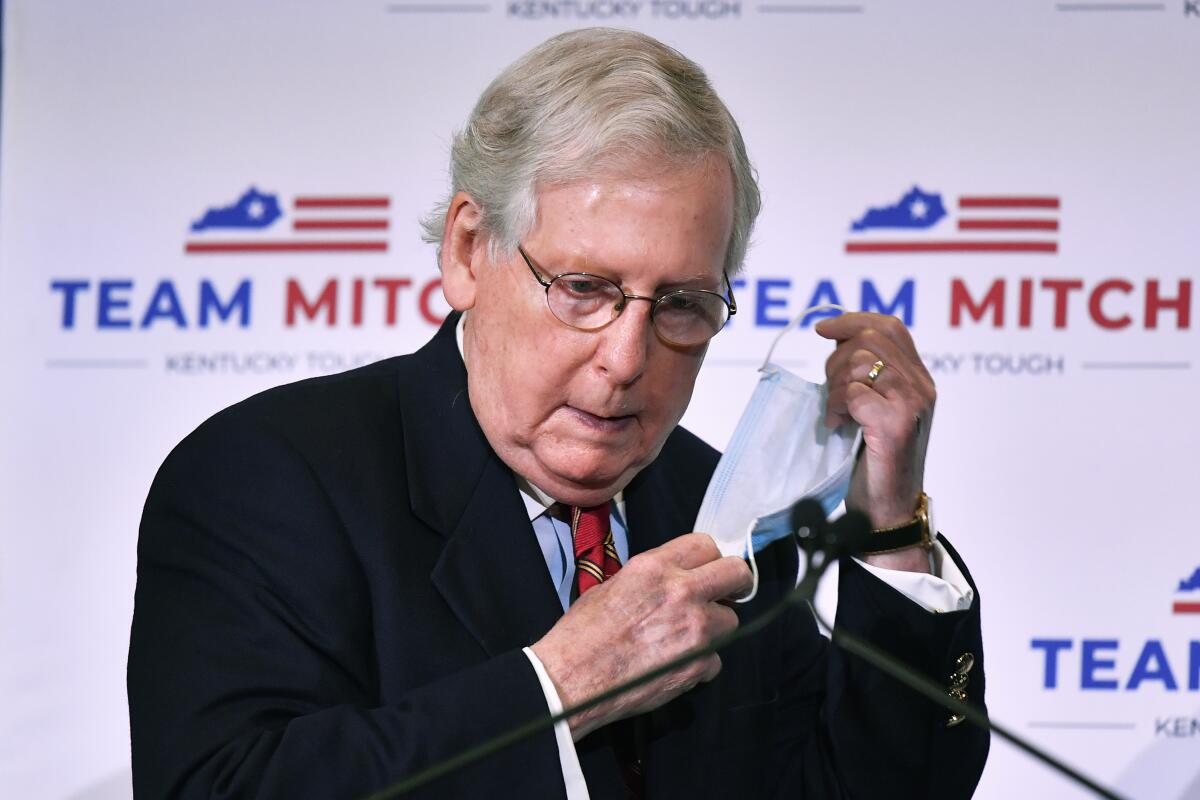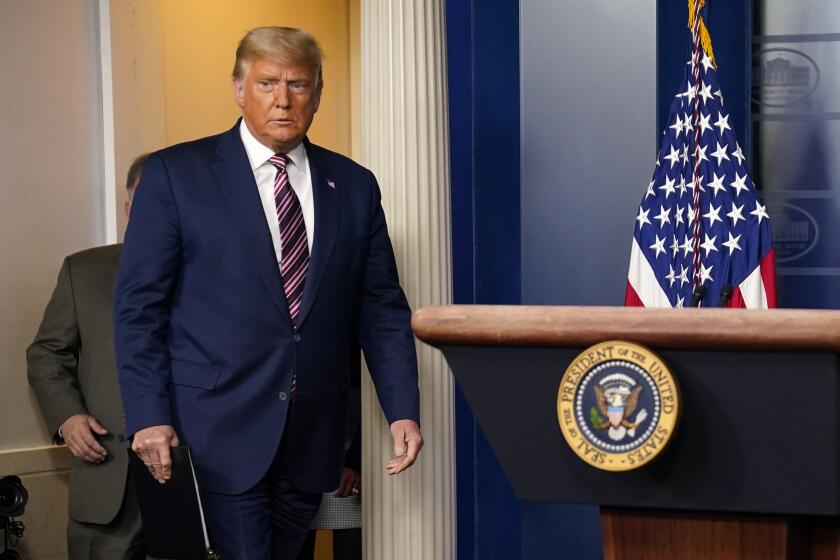Column: Biden wanted to be FDR. Not gonna happen

- Share via
WASHINGTON — Before election day turned into election week, Democrats hoped for a landslide — a blue wave that would not only make Joe Biden president but would wrest control of the Senate from Republicans.
With majorities in both the Senate and House, their pipe dream went, President Biden could enact an ambitious agenda: $4 trillion in new spending on health insurance, climate change and other domestic priorities, paid for by big tax hikes on the wealthy.
A Democratic nominee once dismissed as a bland moderate might even become a transformational president in the mold of Franklin D. Roosevelt.
But the blue wave didn’t arrive. Biden appears to have won the White House by a healthy margin, but Democrats gained only a single seat in the Senate, two less than they needed to take control. They have another chance in Georgia’s runoff elections in January, but the odds don’t look good.
President Trump was widely slammed late Thursday, including by some Republican officials, after again falsely claiming that vote fraud was robbing him of reelection.
That’s why some Democrats have been so disconsolate despite their presidential victory. With the implacable Sen. Mitch McConnell (R-Ky.) running the Senate, they see no prospect of passing the major legislation Biden promised.
That means the Biden era is unlikely to be transformational after all.
At best, it could be a transactional presidency marked by modest hard-won gains but no home runs. At worst, as one Republican strategist put it, it could be remembered merely as “a caretaker presidency” — an interregnum until the next election.
Republicans have few incentives to compromise with the former vice president. McConnell made his reputation — and won his Senate majority in 2014 — by obstructing the legislative agenda of President Obama.
Since then, the two parties and their voters have only grown more polarized. Next year’s Senate Republicans will include even fewer moderates than McConnell’s current caucus, far fewer than when Biden last served in the Senate 12 years ago.
For GOP legislators, making compromises with Democrats is a good way to invite a challenge from the right in the next primary election.
Last week’s election not only failed to produce a repudiation of President Trump within his party; it enshrined Trumpism as the GOP’s dominant ideology.
Trump may stay noisily on the scene, offering commentary and insults if any Republicans seek deals with the man who defeated him. He could even run for another term in 2024.
“In the age of hyper-partisanship, senators who stray too far end up as roadkill,” said James P. Manley, a Democratic strategist who spent 21 years as a Senate aide.
“Biden will try to deal with McConnell, but I don’t see any chance of a real honeymoon,” Manley told me. “There aren’t many deals Biden can cut with him — and certainly not many that will be acceptable to other Democrats.”
That’s the conventional wisdom in Washington, based on years of hard experience.
But there’s another, more optimistic view: Biden and McConnell had a solid working relationship during the Obama administration, and they negotiated a series of budget deals.
Maybe, just maybe, the life-and-death stakes of the COVID-19 pandemic can induce them to work together again.
Biden has said he wants to try.
“If we can decide not to cooperate, we can decide to cooperate,” he said in his victory speech Saturday. “I believe this is part of the mandate given to us from the American people. They want us to cooperate in their interest, and that’s the choice I’ll make.”
How to do it? William A. Galston of the Brookings Institution, one of the organizers of a bipartisan group called “No Labels,” has been arranging quiet talks among senators of both parties.
The first step, he told me, is for the two sides to compromise over a relief package to reduce the economic pain caused by the pandemic — “a confidence-building measure,” he said.
After that, Biden could pick other issues where the two parties share at least a sliver of common ground: infrastructure spending, China policy, perhaps police reform.
“President Biden is going to have to ask the leftward members of his own party to be realistic,” said Galston, a former aide to President Clinton. That means deferring priorities like healthcare and climate change until later, he said.
If Biden takes that route, expect a major revolt from the left.
It would be nice to think Galston is right: that modest experiments in bipartisanship could lead to better things down the road. It’s surely worth a try.
But put me down as a skeptic. The partisan incentives pushing Republicans to resist any measure that bears Biden’s name will be enormous.
Even without bipartisan help, Biden can change plenty of federal policies through executive action, just as Obama and Trump did. He can undo most of Trump’s wrecking-ball crusade against environmental, consumer, labor and financial regulations. He can reverse the deliberately cruel application of immigration laws. And he can change foreign policy, rebuilding alliances that Trump disdained.
But when it comes to legislation, Biden is unlikely to get his chance to be a transformational president like FDR. Instead, through no fault of his own, his tenure may earn a less-inspiring label: a gridlock presidency.
More to Read
Get the L.A. Times Politics newsletter
Deeply reported insights into legislation, politics and policy from Sacramento, Washington and beyond. In your inbox three times per week.
You may occasionally receive promotional content from the Los Angeles Times.












